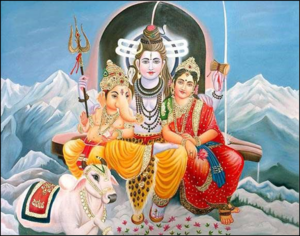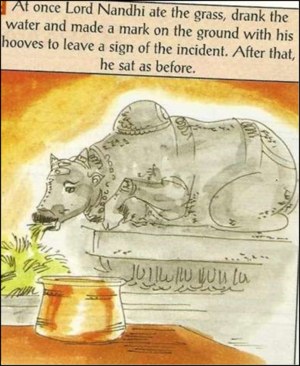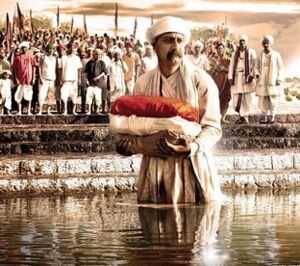Talk:Bhagavān protects the faith of His bhakta-s
By Vishal Agarwal
Sometimes, the very Shraddhā and Bhakti of Bhakti Yogī-s come under threat. The expressions of Bhakti like festivals, sacred shrines, etc., come under attack by inimical forces. Several narratives in the Hindu tradition recount instances where Divine intervention or miracles saved their destruction, preserving the Bhakti and Shraddhā of the devotees.
Story: The Miracle of Shivarātri in Kashmir
Shivaratri is a festival that celebrates the wedding anniversary of Shiva and Parvati. It is the most important festival of Hindus in the valley of Kashmir in northern India. Here, Hindus celebrate the Shivaratri festival for 21 days during the month of Phalgun (in February-March). At that time of the year, Kashmir typically has snow, and therefore, traditional Kashmiri songs describe Shiva looking like a Prince when he walks through falling flakes of snow to marry Princess Parvati.
Unfortunately, about 200 years ago (i.e., in the early 19th cent.), Kashmir was ruled by an Afghan governor named Jabbar Khan. He was an extremely fanatical Muslim and disliked the Kashmiri Hindus. When he learned that Kashmiri Hindus liked to sing songs to Shiva and describe the snowfall during His wedding, he came up with a plan to hurt the Hindus. He ordered that Hindus will no longer celebrate the festival during winter when it snows in Kashmir. Instead, they will celebrate it in June, the warmest month, when there is no snow.
The Hindus were deeply hurt when they heard of the order because it had always snowed on Shivaratri every year. This year, however, they would have to celebrate it during summer. But they had no choice. So, they prepared to celebrate the festival in the month of Aashaadha (June-July). Jabbar Khan thought that the Hindus would not celebrate the festival at all. But a miracle happened! The day in summer when the Kashmiri Hindus were celebrating the festival, there was a sudden blizzard in Kashmir. Snow in June was unheard of in Kashmir. Jabbar Khan was terrified to witness the wrath of Shiva. The blizzard was a miracle and caused utter surprise (‘Hairat’) due to which Shivaratri is even today called by the name ‘Hairat’ in Kashmir. ‘Hairat’ is a word in the Persian language and it means ‘utter surprise.’
The unseasonal snow destroyed the summer crops in Kashmir. Due to the misery that the fanaticism of Jabbar Khan had caused, all the people of Kashmir, whether they were Hindus or Muslims, cursed him. After some time, finally fed up with his oppression, a few Hindus went to appeal to Maharaja Ranjit Singh, the Sikh Emperor of Punjab, to invade their land and free them from Afghan rule. With their help, the Sikh forces drove out the Afghans from Kashmir, and Jabbar Khan himself barely fled with his life, in tattered rags.
Story: When the Mūrti of Nandi ate Grass
In the city of Jaffna in Sri Lanka, there is a famous Shiva Mandir called Thanthondreesvara. Like all Shiva Mandirs, a stone Mūrti of Nandi is at the entrance, facing the Shivalinga. Several hundred years ago, European invaders occupied Jaffna. The Europeans sometimes forced Hindus to convert to Christianity. They also destroyed many Hindu Mandirs and built Churches in their place.
One day, a European army commander entered the Shiva Mandir with his shoes on. He asked the priest rudely, “Why do you have a stone bull sitting in your Mandir?” The priest replied, “This is no ordinary bull. It is Nandi, the bull of Shiva. It is here to guard the Mandir.”
The commander laughed, “Can this bull eat grass? If not, then how can it even protect the Mandir?” The priest replied, “Of course, it can eat grass.” The commander said, “I will come tomorrow with some cannons. If your bull does not eat grass, then I will blow away your Mandir with my cannons.” The priest went home and told about the threat from the European commander to his wife. She said, “Pray to Shiva. He will surely suggest a way out to us.” When the priest was sleeping that night, Shiva came to him in a dream and said, “Do not worry. Tomorrow morning when that commander comes, put some grass in front of Nandi, and offer it some water.”
The next morning, when the commander arrived, he reminded the priest that if the stone bull did not eat grass, then he would destroy the Mandir and force Hindus to become Christians. The priest said a prayer to Shiva. Then, he placed some grass in front of the Nandi Mūrti and offered it some water in a pitcher.
The Writings of Sant Tukārām (1608 – 1649 CE) are Preserved through a Miracle
Sant Tukārām was a low-caste Hindu who lived a mere 41 years (1608 – 1649). He lived a very difficult life and lost his money, children, and his honor. He remarried, but the second wife was very cruel to him. He was a very saintly person. Once, the great Hindu Emperor Shivaji approached him and requested him to become his Guru. Sant Tukārām instead asked him to meet with Swami Samartha Rāmadāsa and request him to be his Guru. Shivaji agreed to Sant Tukārām’s suggestion.
Tukārām wrote thousands of beautiful poems called ‘abhangs’ in his mother tongue. Crowds of people gathered around him and sang these abhangs with bhakti towards Vitthala. A local Pandit named Rāmeshwar Bhat became very jealous of Tukārām. He started spreading the rumor that Tukārām’s abhangs were misleading the people about the true teachings of Vedas and other Hindu scriptures. It was a sin to sing and listen to these abhangs because only Brahmins could teach others about Dharm and because religious teaching should be given only from Sanskrit scriptures, not through local languages like Marathi, in which the abhangs were written.
A meeting of the local Pandits was called, and in an act of great injustice, Tukārām was ordered to throw the books in which he had written his abhangs into the river. With tears in his eyes, he obeyed the command and threw his books into the waters. The people who had gathered to watch the event saw with great anguish the pages of the booklets being carried away by the waters. Tukārām was also ordered not to write any more new abhangs.
This injustice greatly saddened Sant Tukārām. One day, he sat on the banks of the river and cried, “Bhagavān Vitthala, what you did to me was not fair. I have had a very difficult life. I lost all my wealth. My son died. My first wife died and my second wife is very cruel to me. But when I wrote these abhangs to you, I forgot my sorrows and ill luck and felt happy that at least You loved me. I never complained to you. But now, even my abhangs through which I spoke to you, have been taken away from me. Why don’t you take my life too?”
Tukārām wept and sang his sorrow in the form of an abhang. And a miracle happened. As the onlookers watched in surprise, his books reappeared from the waters, with no damage from water to a single page or the writing!
Tukārām was greatly moved by the mercy of Bhagavān Vitthala and sang, “I am sorry that I doubted your love. You are more loving than my mother. You have shown your mercy on a humble man like me. Please grant me a wish that I find always a place at your lotus like beautiful feet.”
Everyone praised the bhakti of Tukārām. Rāmeshwar Bhatt and his fellow Pandits felt great shame at the miracle and became Tukārām’s disciples. Sant Tukārām’s surviving abhangs number around 4600. Many later Hindu Sants and great poets have translated them into other languages because of their beauty.




